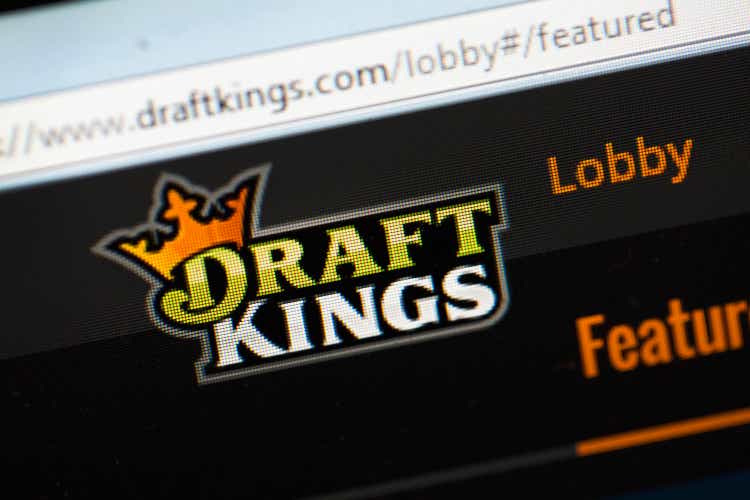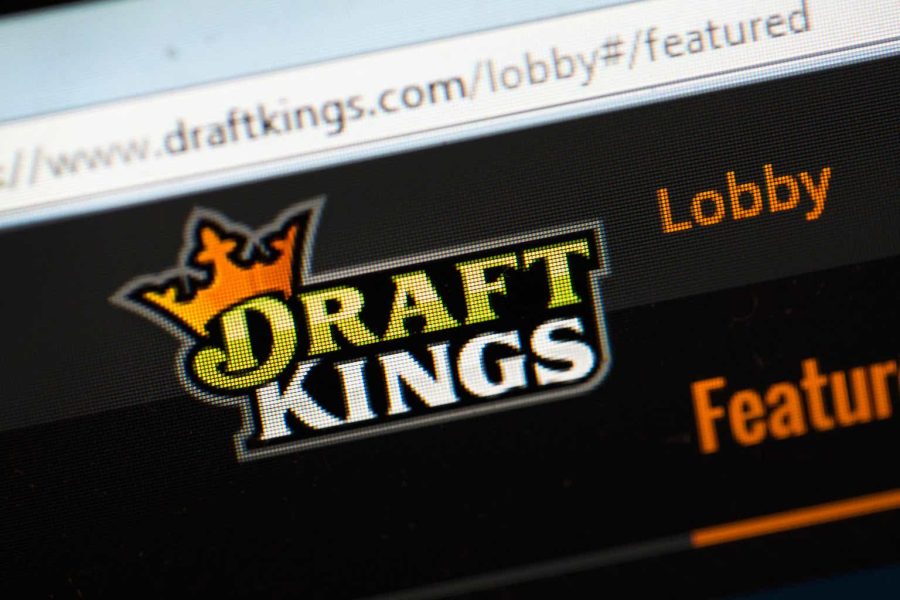Summary:
- DraftKings has been showing great operating leverage in recent quarters.
- The acquisition of the lottery app Jackpocket looks like it could be a winner.
- DKNG should have a strong Q1 from Super Bowl and March Madness betting.
Scott Olson
Last March, I started coverage of DraftKings (NASDAQ:DKNG), saying the opportunity in front of DKNG was evident, but the stock was speculative until it could show positive EBITDA and free cash flow. More recently, I upgraded the stock to “Buy” in November, saying the company was demonstrating that its outer-year targets are not only achievable but also beatable. With the company reporting results last month and management recently attending an investor conference, let’s catch up on the name.
Q4 Earnings And Investor Conference
DKNG was recently at the Morgan Stanley Technology, Media & Telecom Conference earlier this month talking about its business. At the conference, the company noted that its online betting app is still not in the three largest states – California, Texas, and Florida – which have not yet legalized online sports betting. It said there should be a vote in Texas next year and in California and Florida it will be on the ballot in 2026. With states needing more revenue, it was hopeful that they would legalize online sports betting.
The company also talked about its recent $750 million acquisition ($412.5 million in cash, and $337.5 million in stock) of lottery app Jackpocket. DKNG has projected the deal will add $260-$340 million in revenue and $60-$100 million in adjusted EBITDA in fiscal year 2026.
Discussing the deal at the conference, CEO Jason Robins said:
Everything starts with product. As I said, and this is a unique product that we don’t have today. And one that we know is both mass market and a very efficient vehicle for acquiring customers. We know that their CACs have been historically about 20% of what our CACs are so 4-5x lower. So I think that’s a huge advantage. And then when you combine that with the fact that we also know from an overlap analysis that we did during our diligence process that these customers cross-sell very effectively onto OSB and iGaming.
And we also saw that the average cost of it overlap between Jackpocket and DraftKings actually spent 50% more on DraftKings than the average customer that did not. So not only is there good overlap, they also tend to be higher value customers, too. So really big synergy there. And I think that only continues to increase as more states roll out OSB and iGaming, very similar to the role DFS has played for us. It will just be a way that we can build up a database and build the brand in states that don’t yet have online sports betting and iGaming.
And then once those states do launch it, it is different and even better than DFS [as it] is a much cheaper customer acquisition vehicle than many of those other products. … And I also think there’s a lot of upside for Jackpocket to get into more states. They built a really interesting and hard to replicate platform that allows them to process hundreds of thousands of tickets and it’s a complicated business because it’s not fully digital. They actually have to print and process the physical ticket. So it’s not something easy to do.”
Turning to the company’s Q4 reported in mid-February, DKNG posted adjusted EBITDA of $151.0 million compared to a loss of -$49.9 million a year ago.
For the quarter, DKNG saw revenue jump 44% to $1.23 billion, basically in line with analyst estimates. Adjusted EPS came in at 29 cents versus an expectation for adjusted EPS of 18 cents.
Monthly Unique Payers (MUP) climbed 37% to 3.5 million, while average revenue per MUP rose 6% to $116.
Its Sportsbook hold percentage was 10.4% in the quarter, helped by more parlay betting. Adjusted gross margin, meanwhile, rose 200 basis points year over year.
Sales & Marketing expense fell nearly -16% to $290.8 million. As a percentage of revenue, S&M expenses were 23.6% compared to 40.3% a year ago.
Looking ahead, DKNG upped its full-year revenue guidance to a range of between $4.65-4.90 billion, up from prior guidance of between $4.50-4.80 billion. That equates to growth of 27-34%.
The company now expects to post full-year adjusted EBITDA of between $410-$510 million, an improvement from a previous forecast of $350-$450 million.
It also is expecting an improvement in adjusted gross margin rate to between 43.5%-45.0%.
The company ended the quarter with $1.1 billion in cash and equivalents and no debt.
For 2024, the company is forecasting revenue of between $4.5-4.8 billion and adjusted EBITDA of between $350-450 million.
The company will launch in North Carolina, the 9th largest state by population, on March 11th. That will bring the total number of states it operates in to 27.
DKNG continues to put up solid growth, but perhaps the biggest takeaway from the quarter is how once again the company not only leveraged SG&A, but it also meaningfully reduced it on an absolute basis. This is really one of the big keys towards the company reaching some of those big adjusted EBITDA projections in a few years.
In addition, the company also continued to show a stronghold percentage. This is coming from DKNG offering more parlay options, which favor the house much more than the bettor.
The acquisition of Jackpocket, meanwhile, looks like a solid deal. With a low customer acquisition cost, there could be some nice crossing-selling opportunities, and DKNG should be able to get the app into the more than 14 states it is in now.
Meanwhile, the company will have even more upside if it can get into any of the three big states of California, Texas, and Florida in the next few years. None of these states are in long-term projections and have some huge upside potential.
Valuation
DKNG trades ~41x the 2024 consensus EBITDA of $483.4 million and ~20x the 2025 consensus of $985.8 million.
It trades at a forward PE of 34.3x the 2025 consensus of $1.26.
DKNG is projected to see its revenue increase 30.6% in 2024 and 20.6% in 2025.
At its investor day earlier in November, it said it expects to generate $1.4 billion in adjusted EBITDA in 2026 on $6.2 billion in revenue and $2.1 billion in adjusted EBITDA in 2028 on $7.1 billion in revenue. Notably, those calculations assume the company doesn’t enter any other states. I’ve previously said I think it could get to $1.6 billion in 2027 adjusted EBITDA by getting to 55% gross margins, which it has achieved in 12 states, and keeping S&M expenses in check.
When adding the Jackpocket EBITDA ($100 million) and purchase price into the equation, the company would trade at 11.7x my 2026 EBITDA projections of $1.7 billion. Given its projected strong growth, I’d value the company at between 15-20x my 2026 projection, which would be a fair value range between $52-70.
Conclusion
DKNG is showing both strong growth and expense leverage, which sets it up to reach and then exceed the long-term projections it has laid out. The potential of another large state, such as California, Texas, or Florida, legalizing online sports betting only adds additional upside optionality to the stock.
DKNG has done a nice job of consistently raising its guidance, and with strong betting for the Super Bowl and March Madness, I’d expect Q1 to be a very good quarter. Getting into the college basketball-crazy state of North Carolina before March Madness should be a nice windfall for revenue.
I continue to rate DKNG a “Buy” and will increase my price target from $55 to $60 as a result of solid momentum and the Jackpocket deal.
The biggest risk to the DKNG thesis would be a slowdown in online betting, which could happen if the economy slows. There is also a lot of competition in the space, so if it has to increase its sales and marketing to lure in customers, it would make it more difficult to get to its longer-term projections.
Analyst’s Disclosure: I/we have no stock, option or similar derivative position in any of the companies mentioned, and no plans to initiate any such positions within the next 72 hours. I wrote this article myself, and it expresses my own opinions. I am not receiving compensation for it (other than from Seeking Alpha). I have no business relationship with any company whose stock is mentioned in this article.
Seeking Alpha’s Disclosure: Past performance is no guarantee of future results. No recommendation or advice is being given as to whether any investment is suitable for a particular investor. Any views or opinions expressed above may not reflect those of Seeking Alpha as a whole. Seeking Alpha is not a licensed securities dealer, broker or US investment adviser or investment bank. Our analysts are third party authors that include both professional investors and individual investors who may not be licensed or certified by any institute or regulatory body.
